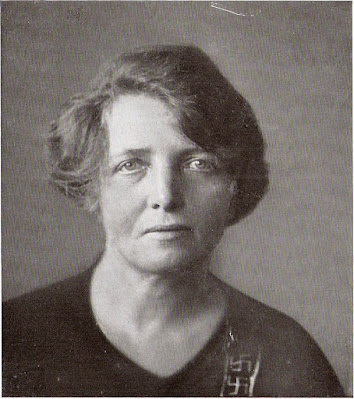Scientific Nordic Paganism - Table of Contents
by Vincent Bruno
Vincent.Bruno.1229@gmail.com
Mathilde Ludendorff
Founder of Bund für Gotteserkenntnis
(Society for the Knowledge of God)
(Society for the Knowledge of God)
Psychiatrist, philosopher, anti-Christian, anti-Freemason,
anti-Jewish, anti-occult, Nordic pagan racialist
anti-Jewish, anti-occult, Nordic pagan racialist
Most of Mathilde Ludendorff's writings are in German and are rare,
please help me purchase them and translate them into English.
Donate: https://www.patreon.com/VincentBruno
Donate: https://www.patreon.com/VincentBruno
This page is dedicated to compiling and expounding upon the philosophy of Psychiatrist Mathilde Ludendorff, the wife of Erich Ludendorff, the early close associate of Adolph Hiter. Mathilde founded the Society for the Knowledge of God which sought to create a purely Germanic scientific pagan religion free from not only Christianity but much of nonsensical occultism and theosophy, including Hinduism. She was extremely anti-Jewish, anti-Catholic, anti-Freemason, anti-Communist, and even anti-Buddhist. Her ideas were too radical for the Nazis who banned her organization for some time (but then reinstated it) and she remained banned mostly after the war until the 1970s; she still has a small cult following in Europe today but her followers are monitored by the government. Also researched here are the goings-on of Mathilde's husband Erich Ludendorff. This blog is to present and analyze her work and the work of her movement to see if this is a viable religious framework of Northern European racial and cultural solidarity. If so then it should be promoted among Nordic people. In addition, A.I. is used to tweak and correct her philosophy to produce new intellectual works for reflection and possible adoption.
Book Review
Triumph of the Immortal Will
By Mathilde Ludendorff
AI Essays on Mathilde Ludendorff's Philosophy
Tinkering with Ludendorff's Philosophy
AI Remakes Of The Ludendorff Philosophy
AI Remakes Of The Ludendorff Philosophy
AI makes Mathilde Ludendorff's ideology polytheistic pluralism
AI Creates Nordic Racialist Pantheon of Gods for Polytheistic Ludendorffism
AI mixes Raymond Cattell's Beyondism with the polytheistic version of Mathilde Ludendorff's philosophy
COSMIC RATIONALISM
AI FIXES THE LUDENDORFF RELIGION
AI FIXES THE LUDENDORFF RELIGION
RATIONAL PLURALISM
AI Updates Ludendorff
AI Updates Ludendorff
Rational Pluralism - AI Rewrites Triumph of the Immortal Will (Mathilde Ludendorff Transformed)
Rational Pluralism (Mathild Ludendorff transformed) and the question of the meaning of "outside spacetime"
Rational Pluralism (Mathild Ludendorff transformed) and the question of the meaning of "outside spacetime"
Rational Pluralism (Mathilde Ludendorff transformed) and ethics/courts
Rational Pluralism (Mathild Ludendorff transformed) and Abrahamic monotheism
Rational Pluralism (Mathild Ludendorff transformed) and Abrahamic monotheism
Rational Pluralism (Mathilde Ludendorff transformed) and Hindu Advaita Vedanta
Rational Pluralism (Mathilde Ludendorff transformed) and Jainism
Rational Pluralism (Mathilde Ludendorff transformed) and Zoroastrianism
Rational Pluralism (Mathilde Ludendorff transformed) and Confucianism
Rational Pluralism (Mathilde Ludendorff transformed) on miracles and the occult
Does Rational Pluralism (Mathilde Ludendorff transformed) have anything like a pantheon?
Ethical Pluralism (a new Mathilde Ludendorff) and Jainism
Ethical Pluralism (a new Mathilde Ludendorff) and quantum mechanics
Ethical Pluralism (a new Mathilde Ludendorff) and Eddy's Christian Science
Ethical Pluralism (a new Mathilde Ludendorff) and the definition of spirituality
Rational Pluralism (Mathilde Ludendorff transformed) and Zoroastrianism
Rational Pluralism (Mathilde Ludendorff transformed) and animism
Rational Pluralism (Mathilde Ludendorff transformed) and European Polytheism
Rational Pluralism (Mathilde Ludendorff transformed) and European Polytheism
Rational Pluralism (Mathilde Ludendorff transformed) on miracles and the occult
Does Rational Pluralism (Mathilde Ludendorff transformed) have anything like a pantheon?
Rational Pluralism (Mathilde Ludendorff transformed) on panentheism
Exploring Process Theology in Rational Pluralism (Mathilde Ludendorff transformed)
Comparing Rational Pluralism (Mathilde Ludendorff transformed) to Whitehead
Exploring Process Theology in Rational Pluralism (Mathilde Ludendorff transformed)
Comparing Rational Pluralism (Mathilde Ludendorff transformed) to Whitehead
Rational Pluralism (Mathilde Ludendorff transformed) and existentialism
Rational Pluralism (Mathilde Ludendorff transformed) and the question of good and evil
What exactly does Rational Pluralism (Mathilde Ludendorff transformed) mean by god-living?
What is the psychological profile of the type of person who would believe in Rational Pluralism (Mathilde Ludendorff transformed)?
Rational Pluralism (Mathilde Ludendorff transformed) and the question of good and evil
What exactly does Rational Pluralism (Mathilde Ludendorff transformed) mean by god-living?
What is the psychological profile of the type of person who would believe in Rational Pluralism (Mathilde Ludendorff transformed)?
ETHICAL PLURALISM
AI Updates Ludendorff
AI Updates Ludendorff
Ethical Pluralism (a new Mathilde Ludendorff) in relation to Kantian noumena
Ethical Pluralism (a new Mathilde Ludendorff) on ethics and courts
Ethical Pluralism (a new Mathilde Ludendorff) on ethics and courts
Ethical Pluralism (a new Mathilde Ludendorff) and Buddhism
Ethical Pluralism (a new Mathilde Ludendorff) and Taoism
Ethical Pluralism (a new Mathilde Ludendorff) and Taoism
Ethical Pluralism (a new Mathilde Ludendorff) and Jainism
Ethical Pluralism (a new Mathilde Ludendorff) and animism
Ethical Pluralism (a new Mathilde Ludendorff) and European polytheism
Ethical Pluralism (a new Mathilde Ludendorff) and European polytheism
What does Ethical Pluralism (a new Mathilde Ludendorff) mean by God-Cognisance and God-Living?
Ethical Pluralism (a new Mathilde Ludendorff) and sex ethics
Why are premarital sex and homosexuality not unethical in Ethical Pluralism (a new Mathilde Ludendorff)
Ethical Pluralism (a new Mathilde Ludendorff) and sex ethics
Why are premarital sex and homosexuality not unethical in Ethical Pluralism (a new Mathilde Ludendorff)
Ethical Pluralism (a new Mathilde Ludendorff) and quantum mechanics
Ethical Pluralism (a new Mathilde Ludendorff) and Eddy's Christian Science
Ethical Pluralism (a new Mathilde Ludendorff) and the definition of spirituality



Comments
Post a Comment